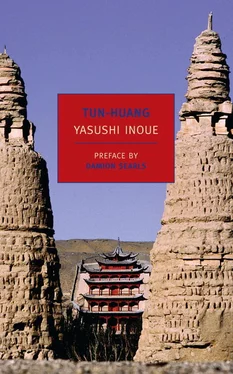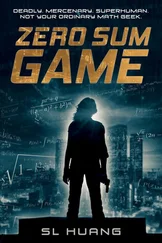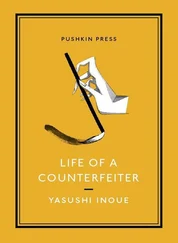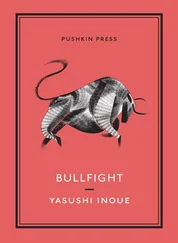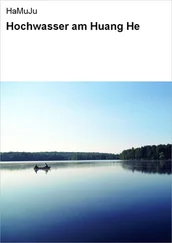The winter cold had lessened somewhat from the previous day. Shortly before noon the forces entered wastelands with willow groves scattered here and there. Walking became easier and the men quickened their pace. Soon, in the fields surrounding Sha-chou, they reached a settlement.
As before, Kuang continued to ride ahead. From a distance it appeared as though he, with his family banner fluttering high in the air, was leading two thousand of his own men.
In the fields numerous irrigation ditches were laid out at regular intervals, and since they ran diagonally across the troops’ path, the men were forced to walk a little and then detour, go on a little further and make another detour, just as if they were walking across a green checkerboard.
The unit reached the banks of the Tang River. Willows grew there and the river was frozen over. When they had crossed it, Hsing-te saw the walls of Sha-chou ahead. They were more splendid and ornate than any others he had seen on the frontier. They reminded him of his motherland, China.
The troops soon entered the marketplace outside the city near the South Gate. Shops selling all types of wares lined the streets, and the cobblestone roads were filled with men and women, young and old, jostling one another. It was inevitable that in less than a day a great catastrophe would befall this town, but these residents were blissfully ignorant of this and the town was bustling and peaceful. However, they watched with curiosity as weary soldiers with features like theirs entered the city. Hsing-te felt as if he had returned to China. Everything he saw reminded him of home.
At the open space just outside the city gate, the troops ended their long, grueling march. Led by Yen-hui, Hsing-te and Wang-li went on to Regional Commander Ts’ao Hsien-shun’s palace in the city center. It was a lavish and beautiful building.
Ts’ao Hsien-shun, a man in his fifties, was small in stature, but he was every inch a warrior, with flashing eyes and an air of determination. He leaned back a little on his chair and listened without expression to his brother’s tale, after which he said, “I knew we would be invaded by the Hsi-hsia sometime. It is happening earlier than I expected. We’ll have to fight, to defend the honor of all those Sha-chou regional commanders since the days of Chang I-ch’ao. My only regret is that Sha-chou does not have the military power to oppose the mighty Hsi-hsia armies. This will mean the Ts’ao dynasty will fall during my reign, but it cannot be helped. It is said that in the past this country was subdued by the Turfans, and that for years the Chinese were forced to wear Turfan dress. Only during festivals were they allowed Chinese clothes, and at such times they looked up to heaven and lamented their bondage. The people will probably be placed in a similar position again. But it is impossible for one race to control this land forever. Just as the Turfans left, the Hsi-hsia will probably leave, too. And after their departure our descendants will remain, prevailing through it like indestructible weeds. Of this only are we certain. It is because there are more Chinese souls resting here than those of any other race. This is Chinese soil.”
Hsien-shun spoke calmly with no sign of agitation. As might be expected of one who had been designated regional commander twenty years previously by Sung China upon his father Tsung-shou’s death in 1016 and had since ruled Shachou, he had self-possession and dignity.
Hsing-te sent a messenger to call Kuang to the palace, and he arrived immediately. Hsing-te and Kuang related the situation prevailing in Central Asia to Hsien-shun, but the latter was not at all surprised. He waited for Kuang to finish his tale and then said, “The Muslims may invade, but we are not really sure, are we? Sha-chou will probably be destroyed by the Hsi-hsia before that takes place. Don’t worry about it, young heir of the Wei-ch’ih family.”
Kuang stared hard at the Sha-chou ruler, then said, “Do you mean you think the Muslims will fight the Hsi-hsia?”
“That is very probable,” replied Hsien-shun.
“Which side do you think will win?”
“It’s hard to say. Unlike Sha-chou, the Muslims and the Hsi-hsia both have great military power and, as was the case with China and Khitan, both will suffer victories and losses and casualties.
The determined young man appeared to reflect upon this for a time, then said, “I’m going to live until then. I’ll have to live to see such fascinating times. The banner of the Wei-ch’ih dynasty will survive the war.”
Hsing-te reflected that no matter what the times brought, this rash young man would live through it all just as he had said. No doubt he would use elephants in place of camels, and travel back and forth between east and west with his family banner waving high in the desert.
After the meal was ended, Hsien-shun told Wang-li that it would probably be three or four days before the Hsi-hsia army attacked, so he wanted Wang-li’s forces to have a complete rest. In the meantime, Hsien-shun’s own troops would be preparing for battle, digging traps for enemy horses outside the city wall.
Wang-li, Hsing-te, and Kuang left the palace. Once outside, Wang-li and Hsing-te parted with Kuang.
In their quarters, Wang-li mentioned that whether or not Hsien-shun was a good military strategist, he would follow his advice and have a good rest. The troops and officers should sleep for three solid days and nights, just as Hsien-shun had suggested; they could wake up when the battle drums of the Hsi-hsia army sounded. Hsing-te thought he must be joking, but Wang-li looked serious.
Five of the seventeen temples in Sha-chou were given over to the troops for billets. Hsing-te went to the room assigned him and fell asleep.
He was awakened in the middle of the night. Drums were rolling. Thinking that the Hsi-hsia had come, he went outside. There were no signs of an attack, and small groups of armed soldiers passed by at regular intervals on the road in front of the temple, bathed in cold, wintry moonlight.
Toward dawn, Hsing-te was awakened once more. This time the commotion came from crowds of people far and near. He could hear human voices as well as the neighing of horses. Hsing-te went outdoors again. Daylight was beginning to illuminate the area. A continuous line of evacuees was passing by: women, children, and old people. Here everything was conducted efficiently, it seemed. After that, Hsing-te interrupted his sleep only to eat. Each time he got up the tumult in the town had increased, but by this time he had learned to sleep through it all.
By the evening following their arrival in Sha-chou, Hsing-te awoke feeling completely rested. The soldiers all started to get up as if it had been pre-planned and left their barracks to gather in the square, although no special orders had been issued. Wang-li also came. About half the two thousand troops had come to the square and had built bonfires here and there, about which they were now gathered.
“Awake already?” Wang-li asked as he saw Hsing-te.
“I couldn’t sleep any more if I tried,” replied Hsing-te.
“Let the rest of the men sleep one more night. Then have them gather here early tomorrow morning. We’ll probably stast battle with the Hsi-hsia army tomorrow evening or the following morning.
With that, Wang-li returned to his quarters.
Hsing-te approached one of the bonfires nearby. He had thought that the group were soldiers, but he found that they were Kuang’s men. Kuang was also present. As soon as he saw Hsing-te he got up and came to him, signaling to Hsing-te with a thrust of his chin to follow him. Hsing-te followed him a little away from the bonfire, and Kuang said, “I’ve been looking for you since yesterday. Do you intend to die or live through the coming battle?”
Читать дальше
